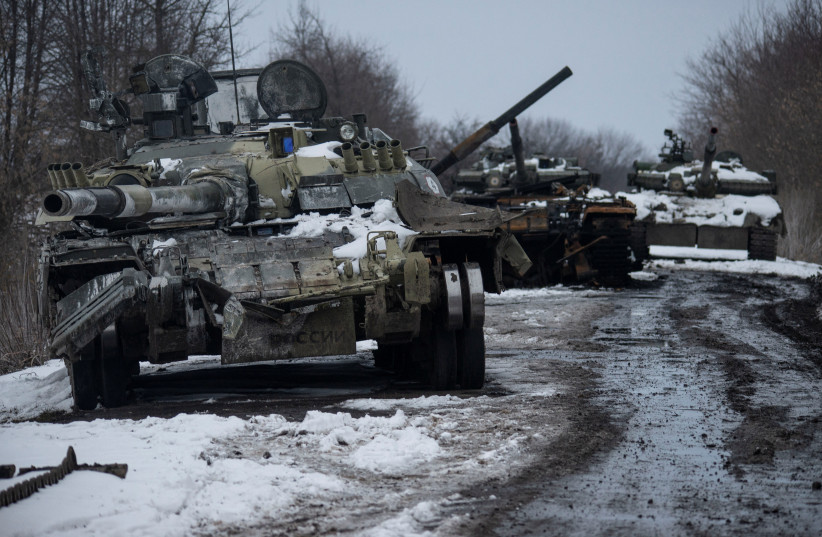Saluted by Pyotr Ilyich Tchaikovsky’s 1812 Overture and its climactic eruption of cannon fire, trumpets and chimes, Russia’s defeat of Napoleon has been justly hailed as a paragon of military valor and national poise.
Faced with a military genius’s invasion heading nearly 700,000 troops, Russia did not lose heart, and in less than half a year chased them away with hardly one tenth of the original Grand Armée intact. The victory was so improbable, decisive, and fateful that it became a landmark in the evolution of Russian nationalism, second in its inspiration only to Russia’s role in defeating Nazi Germany which, as this column has argued (“Who defeated the Nazis?” May 15, 2020), was decisive.
Despite this pair of monumental triumphs and many less dramatic victories over the centuries, Russia also had some spectacular defeats, parts of which now bring to mind the adventure it has entered in Ukraine.
THE INVASION of Finland in November 1939 ended in the Russians’ technical victory, as the brave Finns ultimately surrendered. Psychologically, however, the mighty Red Army was defeated, having lost in four months nearly 200,000 men, 1,100 tanks and 684 aircraft, while the Finns, who had no tanks, lost 25,000 men and 61 aircraft.
It was an appalling performance on the part of a military that deployed a million men who faced just 300,000 Finns, 80 percent of whom were reservists (Duncan Townson, Dictionary of Modern History, 1879-1945, 1994).

Even more perplexing was Russia’s performance in its war with Poland in 1920. It was sparked by Poland’s invasion of Ukraine and occupation of Kyiv in the spring of that year, an offensive that was followed by a Soviet counterattack that pushed the Poles back to the border.
Now overconfident and hoping to use the momentum to spread the young communist evolution westward, Lenin ordered Poland’s invasion, without consulting his government and ignoring the otherwise militant Leon Trotsky’s advice (Robert Service, Lenin: A Biography, 2000, p. 408).
The Red Army thus charged west, only to be stopped outside Warsaw and then pushed beyond the original border. Unlike the Finnish war, this one ended in full defeat, both militarily and politically.
Even so, Russia’s defeat by Japan in 1905 was worse.
Faced with Russia’s emergence in a Chinese seaport, Japan attacked it, and Russia responded by sending a fleet from the Baltic Sea all the way to the Far East, where it was swiftly scuppered by the Japanese.
The defeat, the first handed to Europeans by Asians in seven centuries, shocked the world, and is seen as a harbinger of Czarist Russia’s downfall the following decade.
Even worse was the Crimean War, which began in 1853 when Russia invaded Ottoman lands in today’s Moldova and Romania, and ended with all Russian conquests lost along with some 400,000 soldiers, while British and French armies camped on previously Russian soil.
Not only did Russia fail to realize its war’s aim, to be recognized as custodian of the Ottoman Empire’s Christians, its army lost the status it enjoyed since 1812, as the strongest in the world.
The same happened to the Russians last century when they invaded Afghanistan.
Unlike last year’s American retreat, the Soviet failure in Afghanistan reflected a dying empire’s economic bankruptcy, social decay, and political demise. Fear of Moscow’s military might was thus broken, a mental transition that soon fed anti-Soviet revolutions across the Soviet bloc.
Now, an astonishing number of these fiascos’ elements is resurfacing as Russia’s leaders again succumb to military adventurism’s temptations.
LIKE LENIN when he invaded Poland, Vladimir Putin stormed Ukraine consulting no one, deluding himself that his troops would be welcome, only to be met by a nationalist fury for which he did not prepare.
Like Stalin when he descended on Finland, Putin failed to consider his prey’s ability to fight and its readiness to die. Like Brezhnev when he attacked Afghanistan, Putin failed to configure his economic weaknesses. Like Nikolai II when he attacked Japan, he failed to realize his military’s limitations. And like Nikolai I when he attacked Turkey, he failed to assess the outer world’s response.
More broadly, and most tragically, Putin failed to realize that Russia’s great military victories were struck when it fended off invaders, whereas his Ukrainian campaign was launched with no Hitler marching between Leningrad and Stalingrad, and no Napoleon emerging at Moscow’s gates. Instead, Russia’s latest war brings to mind the imperial fights that its leaders repeatedly picked and lost.
If anything, the elements of Russia’s military glory are now deployed by the very Ukraine it has chosen to attack.
The extent to which the Ukrainians prepared for this war is unclear. Judging by their failure to build bomb shelters, they may have had no preconceived strategy at all. Still, no matter when and how it was born, it now has a strategy and it’s the one Russia deployed against Napoleon.
Napoleon expected to meet the Russian army in a full-blown, head-on collision of the sort in which he specialized. The Russians, however, avoided such a clash, and instead drew him into their hinterland, overstretching his logistical effort and continuously stinging his columns with guerrilla attacks.
This is what the Ukrainians have done, avoiding the armored battles and aerial dogfights for which the Russians prepared. Now, no matter how this war ends, Ukraine has displayed enough national spirit, military resourcefulness, and political wisdom to suggest that even for mighty Russia it is too big to digest, and too prickly to chew.
That is why there is reason to suspect that like the czars of 1853 and 1904, like Lenin in 1920, like Stalin in 1939, and like Brezhnev in 1979, Vladimir Putin chose adventure and will get defeat.
www.MiddleIsrael.net
Amotz Asa-El’s bestselling Mitzad Ha’ivelet Ha’yehudi (The Jewish March of Folly, Yediot Sefarim, 2019), is a revisionist history of the Jewish people’s leadership from antiquity to modernity.
